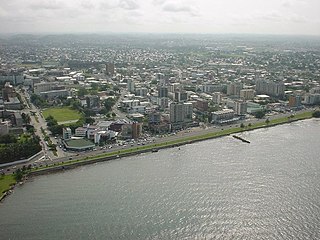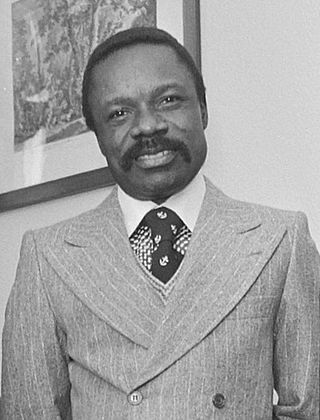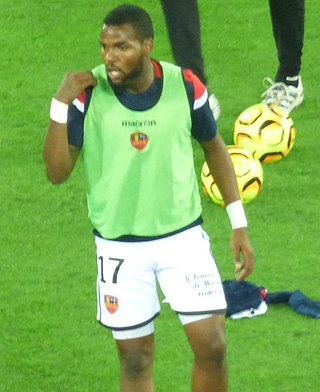 |
|---|
Territorial Assembly elections were held in French Gabon in March 1952. The result was a victory for the Gabonese Democratic and Social Union, which won 14 of the 24 contested seats. [1]
 |
|---|
Territorial Assembly elections were held in French Gabon in March 1952. The result was a victory for the Gabonese Democratic and Social Union, which won 14 of the 24 contested seats. [1]
| Party | Seats | |
|---|---|---|
| Gabonese Democratic and Social Union | 14 | |
| Gabonese Mixed Committee | 2 | |
| Other parties | 8 | |
| Total | 24 | |

Gabon, officially the Gabonese Republic, is a country on the Atlantic coast of Central Africa, on the equator, bordered by Equatorial Guinea to the northwest, Cameroon to the north, the Republic of the Congo to the east and south, and the Gulf of Guinea to the west. It has an area of 270,000 square kilometres (100,000 sq mi) and a population of 2.3 million people. There are coastal plains, mountains, and a savanna in the east. Libreville is the country's capital and largest city.
Little is known of the history of Gabon before European contact. Bantu migrants settled the area beginning in the 14th century. Portuguese explorers and traders arrived in the area in the late 15th century. The coast subsequently became a centre of the transatlantic slave trade with European slave traders arriving to the region in the 16th century. In 1839 and 1841, France established a protectorate over the coast. In 1849, captives released from a captured slave ship founded Libreville. In 1862–1887, France expanded its control including the interior of the state, and took full sovereignty. In 1910 Gabon became part of French Equatorial Africa and in 1960, Gabon became independent.

The economy of Gabon is characterized by strong links with France, large foreign investments, dependence on skilled foreign labor, and decline of agriculture. Gabon on paper enjoys a per capita income four times that of most nations of Africa, but its reliance on resource extraction industry fail to release much of the population from extreme poverty, as much of 30% of the population lives under the poverty threshold.

Libreville is the capital and largest city of Gabon, located on the Gabon Estuary. Libreville occupies 65 square kilometres (25 sq mi) of the northwestern province of Estuaire. Libreville is also a port on the Gabon Estuary, near the Gulf of Guinea. As of the 2013 census, its population was 703,904.

Omar Bongo Ondimba was a Gabonese politician who was the second president of Gabon from 1967 until his death in 2009. Bongo was promoted to key positions as a young official under Gabon's first President Léon M'ba in the 1960s, before being elected the second vice-president in his own right in 1966. In 1967, he succeeded M'ba to become the country's president, upon the latter's death.

The Gabonese Democratic Party is a political party in Gabon. It was the dominant political party in Gabonese politics from 1961 until 2023, when it was deposed in a coup d'état against President Ali Bongo. It was also the sole legal party between 1968 and 1990.

The flag of Gabon is a tricolour consisting of three horizontal green, yellow, and blue bands. Adopted in 1960 to replace the previous colonial flag containing the French Tricolour at the canton, it has been the flag of the Gabonese Republic since the country gained independence that year. The design of the present flag entailed the removal the Tricolour and the widening of the yellow stripe at the centre.
The Gabon national football team represents Gabon in men's international football. The team's nickname is The Panthers and it is governed by the Gabonese Football Federation. They have never qualified for the FIFA World Cup, but have qualified eight times for the Africa Cup of Nations. Gabon is a member of both FIFA and Confederation of African Football (CAF).

The Central African Republic national football team, nicknamed Les Fauves, is the national team of the Central African Republic and is controlled by the Central African Football Federation. They are a member of CAF. Despite being traditionally one of the weakest teams in Africa and the world, they recently achieved success. They won the 2009 CEMAC Cup by beating Gabon in the semi-finals and Equatorial Guinea in the final 3–0. Their FIFA ranking rose from 202nd in August 2010 to 89th by July 2011. On 10 October 2010, they earned a shock 2012 Africa Cup of Nations qualifier win at home against Algeria 2–0, which put them top of their qualification group. The team won its first FIFA World Cup qualifier on 2 June 2012 after beating Botswana 2–0 at home.

In World War II, French West Africa was not a scene of major fighting. Only one large-scale action took place there: the Battle of Dakar. The region remained under the control of Vichy France after the fall of France and until the Allied invasion of North Africa. French Gabon, the only colony of French Equatorial Africa not to join Free France after the armistice, fell to invading Free French Forces from the neighbouring colonies after the Battle of Gabon, further isolating West Africa.

The Trans-Gabon Railway is the only railway in Gabon. It runs 670 km (420 mi) east from Owendo port station in Libreville to Franceville via numerous stations, the main ones being Ndjolé, Lopé, Booué, Lastoursville and Moanda.

Ali Bongo Ondimba, also known as Ali Bongo and Ali Ben Bongo, is a Gabonese former politician who was the third president of Gabon from 2009 to 2023. He is a member of the Gabonese Democratic Party. He is the son of Omar Bongo, who was president of Gabon from 1967 until his death in 2009. During his father's presidency, he was Minister of Foreign Affairs from 1989 to 1991, represented Bongoville as a deputy in the National Assembly from 1991 to 1999, and was the Minister of Defense from 1999 to 2009. After his father's death, he won the 2009 Gabonese presidential election. He was reelected in 2016, in elections marred by numerous irregularities, arrests, human rights violations, and post-election protests and violence.

Christianity is the predominant religion in Gabon, with significant minorities of the adherents of Islam and traditional faiths.
ISO 3166-2:GA is the entry for Gabon in ISO 3166-2, part of the ISO 3166 standard published by the International Organization for Standardization (ISO), which defines codes for the names of the principal subdivisions of all countries coded in ISO 3166-1.

Pierre-Emerick Emiliano François Aubameyang is a professional footballer who plays as a striker for Saudi Pro League club Al-Qadsiah and captains the Gabon national team.

Gabon competed at the 2012 Summer Olympics in London, from 27 July to 12 August 2012. This was the nation's ninth appearance at the Olympics; the nation did not participate at the 1976 Summer Olympics in Montreal and 1980 Summer Olympics in Moscow, affected by the African and the American-led boycott, respectively.

Aaron Salem Boupendza Pozzi is a Gabonese professional footballer who plays as a forward for Liga I club Rapid București and the Gabon national team.

On 7 January 2019, members of the Armed Forces of Gabon announced a coup d'état in Gabon. Military officers claimed that they had ousted President Ali Bongo, who was re-elected in 2016 after a controversial election and protests. During the absence of Ali Bongo, who was receiving medical treatment in Morocco, armed rebels in the capital city Libreville took hostages and declared that they had established a "National Restoration Council" to "restore democracy in Gabon". Widespread internet outages occurred throughout the country, though it is unknown whether the Internet was shut down by the rebels themselves or by civilians. Gabon's government later declared that it had reasserted control.

The COVID-19 pandemic in Gabon was a part of the ongoing worldwide pandemic of coronavirus disease 2019 caused by severe acute respiratory syndrome coronavirus 2. The virus was confirmed to have reached Gabon in March 2020.
Capital punishment in Gabon was officially abolished for all crimes in 2010. Gabon's last execution took place in 1985. Prior to abolition, Gabon was classified as de facto abolitionist, or "abolitionist in practice," due to the length of time since their last execution.